|
|
|
Sort Order |
|
|
|
Items / Page
|
|
|
|
|
|
|
| Srl | Item |
| 1 |
ID:
104067
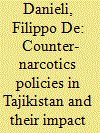

|
|
|
|
|
| Publication |
2011.
|
| Summary/Abstract |
Since the early 1990s, Tajikistan has become a key hub along international opiates-trafficking routes. Tajik security agencies lack the equipment and the skills to effectively counter drug-smuggling networks. Funding from external donors has partially contributed to the renovation and modernization of these agencies. Since the late 1990s both the United States and the European Union have been providing assistance to the Tajik government in the field of counter-narcotics. After 2001 the commitment of Western donors grew and a number of new projects have been launched. This article analyses the characteristics of such projects and explores the misperceptions and the contradictions embedded in the international approach to the question of the drug trade in Tajikistan. The great majority of drug-control-assistance projects aim at border enforcement and strengthening of interdiction capabilities; the Tajik Army and law-enforcement agencies are the main beneficiaries. This military focus of counter-narcotics, it is argued, has produced few results in terms of stemming the flow of heroin from Afghanistan, while, at the same time, it has generated unintended outcomes, such as strengthening power ministries and contributing to the formation of strategic partnerships between criminal and governmental actors.
|
|
|
|
|
|
|
|
|
|
|
|
|
|
|
|
| 2 |
ID:
104062
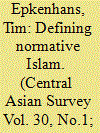

|
|
|
|
|
| Publication |
2011.
|
| Summary/Abstract |
Research on contemporary Islam in Tajikistan and Central Asia frequently refers to the categories of 'official' and 'parallel' to describe, explain and frame regional 'Islam' and Muslim communities. Additionally, the relevant academic discourse is enriched by notions of an 'everyday' opposed to a 'scriptural' Islam. Despite these research paradigms, surprisingly little consistent research has been conducted on the representatives of these alleged spheres of, respectively, 'official' and 'parallel' Islam: their theological, social or political agenda, relations with the state, interactions and networks. Based on an analysis and contextualization of a recent publication of one of Tajikistan's leading religious authorities, Hoji Akbar Turajonzoda, this paper questions the heuristic capability of the prevalent research categories.
|
|
|
|
|
|
|
|
|
|
|
|
|
|
|
|
| 3 |
ID:
104061
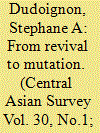

|
|
|
|
|
| Publication |
2011.
|
| Summary/Abstract |
On the basis of a reconstruction of the careers of a variety of religious personnel of Islam in the Tajik Soviet Socialist Republic, from de-Stalinization to independence, this article aims to shed light on some neglected features of Islam in Soviet Central Asia. Questioning the present-day hagiographic process, and confronting the data of oral history with those of pre-modern Muslim hagiography and biographies of religious scholars, this article assesses the specific Islamic revival that has been taking place in Central Asia in the aftermath of the reopening of the Gulag in 1955-56. It also deals with the lasting Kulturkampf, engineered by the Soviet authorities, between the Fergana-born Uzbek-speaking accredited staff of the Muslim Spiritual Board on the one hand, and the Persian-speaking leaders of prominent Sufi lineages with Bukhara and Samarqand pedigrees on the other. The role of mass population transfers in this phenomenon is evoked through their impact on the disruption of the Sufi masters' sacred 'territories' (Persian: qalamraw), and the increasing role of the latter as community builders. Acting as alternative figures to pre-modern khans, the Soviet saints of Islam, who have become the objects of a rich hagiographic process, are also introduced as the bearers and transmitters of pre-modern court culture that vanished from Central Asia in the early 1920s. Special consideration is given to the mutual relationship and competition between the scholars ('ulama) of the Spiritual Board and the gnostics ('urafa) of the Sufi paths, as well as to the former's contribution to a revival of Turkic Islamic culture - notably through the comment of Chaghatay didactical literature within active, though underground, literary circles.
|
|
|
|
|
|
|
|
|
|
|
|
|
|
|
|
| 4 |
ID:
104057


|
|
|
|
|
| Publication |
2011.
|
| Summary/Abstract |
This article examines everyday realities of the state-building process in early Soviet Tajikistan. The work concentrates exclusively on the experiences of 'European' state workers, that is, their uncertain position as 'imperialists', and points to nuances of the early Soviet state building. By observing the mundane micro-level experiences of the state actors from the European parts of the Soviet Union in Central Asia, the author proposes to treat sentiments of state actors as important indicators of the Soviet statehood practices and poses the following question: why did the European state workers feel isolated, unsupported and even helpless and how can we understand their experiences as an integral part of the Soviet empire state-building process? The author argues that individuals' power and powerlessness was at the core of the early Soviet political structure since individual state representatives were to palliate institutional and legal deficiencies - a task that required enormous physical and emotional sacrifices and also included personal responsibility for anything that might have been deemed by the top as a failure.
|
|
|
|
|
|
|
|
|
|
|
|
|
|
|
|
| 5 |
ID:
104055
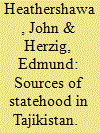

|
|
|
| 6 |
ID:
104059
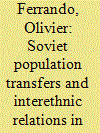

|
|
|
|
|
| Publication |
2011.
|
| Summary/Abstract |
This article explores a key event in the recent history of Central Asia: the 1950s Soviet policy of forced transfers of highlanders down to cotton kolkhozes in the Ferghana Valley. From both a historical and sociological perspective, the article analyses how the displaced population was received in the areas of destination. It sheds light on the concept of ethnicity, in the sense that these transfers were most often analysed in ethnic terms. This approach does not allow for the perception of a complex range of identities based on a nation, a region, a lineage, a religion or a language. The concept of ethnicity seems therefore limited to explain the social dynamics of nation-state formation in a region where identity appears to be multiple, changing and constantly renegotiated.
|
|
|
|
|
|
|
|
|
|
|
|
|
|
|
|
| 7 |
ID:
104063
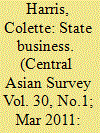

|
|
|
|
|
| Publication |
2011.
|
| Summary/Abstract |
This article examines the relation of the state to masculinity and sexuality by way of an exploration of the sexual problems of a young man and his wife in Tajikistan at the end of the Soviet era. It suggests that the regime's inattention to this kind of issue was bound up with the importance to the state of projecting appropriate versions of masculinity. It further posits the idea that the continued refusal of the independent Tajik state to offer appropriate treatments for sexual dysfunction is consistent with the image of modernity President Rahmon wishes to present to the world. The article shows that as masculinity discursively occupies the superior gender position, with men expected to dominate, the state is itself impotent to respond when they are, in fact, unable to do so in sexual practice. However, the myth of male dominance persists to the point that it may prevent women from seeing beyond their subordination and finding mutually beneficial solutions in their familial and sexual relationships.
|
|
|
|
|
|
|
|
|
|
|
|
|
|
|
|
| 8 |
ID:
104069
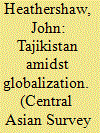

|
|
|
|
|
| Publication |
2011.
|
| Summary/Abstract |
This paper considers the nature of Tajikistani statehood in an era of globalization. It takes as its foil a recent report of the International Crisis Group, 'Tajikistan: on the road to failure'. The paper interrogates this claim and finds that it is based on a poor conceptualization of the state which disregards advances in state theory made in the last two decades. However, this problematic declaration cannot simply be dismissed but, being from an authoritative source, must be considered for its constitutive functions for Tajikistani statehood. The paper thus considers Tajikistan's position in world politics theoretically in terms of the sociological and anthropological literature on global assemblages, particularly Sassen's concept of denationalization. It goes on to investigate a single case of the contemporary Tajikistani state: the state-owned Tajik Aluminium Company's (Talco) international trading arrangements and tolling agreements. The paper argues that the post-Soviet, post-conflict Tajikistani state is not simply captured by elite networks or a shell for the personnel of the regime. Rather, whilst an explicitly 'nationalizing state', it has been transformed along the lines of denationalization. Tajikistan's official institutions, in cooperation with global actors from multinational corporations to donor agencies, have been incorporated within certain global economic and political assemblages. The paper discusses the implications of all this in terms of the consequent hollowing out of the national-territorial state model and the establishing of lines of economics and politics which make the state, in parts, global.
|
|
|
|
|
|
|
|
|
|
|
|
|
|
|
|
| 9 |
ID:
104064


|
|
|
|
|
| Publication |
2011.
|
| Summary/Abstract |
This article argues that rituals are the creative link between state hegemony and the everyday practices of ordinary people. Based on the idea of ritual as experimental technology developed by the Comaroffs (1993), we analyse the Tajik wedding as a means to deal creatively with the tension between the nation-state's claims to exert control over its citizens, on the one hand, and the use of traditions as historical continuity to create a common identity, on the other. Whereas weddings conform to state law and have thus adapted to the changing legal frames during the Soviet period and continue to do so in independent Tajikistan, they have also been used as rituals of cultural resistance in which ethnic, local and national identities are asserted against homogenizing efforts. Taking an historical perspective on weddings, this article contributes to the debate on the role of rituals in the creation and contestation of national identity and state ideologies.
|
|
|
|
|
|
|
|
|
|
|
|
|
|
|
|
|
|
|
|
|